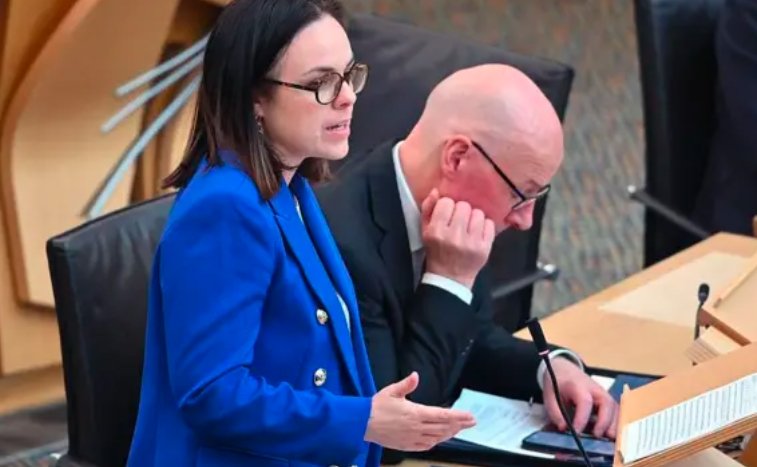The ban, confirmed by Deputy First Minister Kate Forbes, officially came into force this week and marks a long-promised shift towards stricter communications protocols inside Holyrood. The move follows stinging criticism during the UK Covid Inquiry, where it was revealed that key decision-makers had deleted crucial WhatsApp conversations from the pandemic years — undermining public trust and enraging opposition parties.
What’s Actually Changing — and Why Now?
So what’s new? Essentially, Scottish Government officials are no longer allowed to use WhatsApp, Signal, Telegram, or any other “non-corporate” messaging service for official government business. That means all chats, updates, and decisions must now go through formal channels like email or official internal communications platforms.
Forbes framed the change as a step towards “greater openness and transparency.” But critics say it’s too little, too late.
There’s no suggestion ministers were breaking the law by using WhatsApp. But the concern, especially during the Covid pandemic, was that crucial decisions and internal debates were happening in private chats — with no official record, no oversight, and in some cases, no backup.
One-sentence paragraph.
That’s a problem when you’re being investigated for how you handled a national crisis.
Opposition Says Culture Change Is Still Missing
Scottish Conservatives aren’t buying the government’s framing of the move. They’ve accused the SNP-led administration of dragging its feet for months — and only acting now because of the public backlash over the deleted messages.
“This overdue concession won’t fool anyone into thinking there’s been a culture shift,” said a Tory spokesperson, adding that the real issue is not just the tools used, but the lack of record-keeping and accountability during crisis moments.
The timing of the ban matters too. It was originally pledged “by spring 2024” after mounting pressure from the inquiry and Freedom of Information campaigners. But the rollout lagged.
Now, as scrutiny intensifies — and public trust in politicians remains low — officials have finally pulled the plug.
The Inquiry Fallout Still Stings
The UK Covid Inquiry revealed several senior figures in both the UK and Scottish Governments had wiped WhatsApp messages that could’ve shed light on pandemic decision-making. In Scotland, Nicola Sturgeon, John Swinney, and others were accused of failing to retain messages — sparking fury from bereaved families and transparency watchdogs.
The revelations included:
-
Entire chains of messages missing from key decision periods.
-
Lack of clear record-keeping policy during the pandemic’s peak.
-
Admission from ministers that messages were routinely deleted.
The inquiry’s chair, Baroness Hallett, said the practice “seriously undermined” efforts to understand what went wrong.
WhatsApp Isn’t the Only One Out
This new policy doesn’t just affect WhatsApp. It applies to all unofficial communication apps that aren’t run through government-controlled systems. So Signal, Telegram, even Facebook Messenger — all off-limits now.
The goal is to ensure that government conversations — especially those involving decision-making — are captured, stored, and reviewable when needed. It’s a move that brings Holyrood closer in line with Westminster’s own evolving rules, though not all governments have implemented them equally.
Here’s a quick summary of what’s allowed and what’s banned:
| Messaging Tool | Status | Notes |
|---|---|---|
| Banned | End-to-end encrypted, hard to audit | |
| Signal | Banned | Ephemeral messages, no trace |
| Email (gov accounts) | Approved | Logged and stored |
| Microsoft Teams/Outlook | Approved | Government-managed platforms |
| SMS/Text (Personal) | Discouraged | Hard to archive, lacks oversight |
Ministers Under Pressure to Prove Lessons Are Learned
For Kate Forbes, who recently stepped into the role of Deputy First Minister under John Swinney, this is an early test of credibility. She insists the ban is about improving public confidence and ensuring no more crucial records vanish in the future.
But some observers aren’t so sure the issue is fixed. They point to the lack of sanctions for those who previously deleted messages and ask whether a simple ban goes far enough.
“There needs to be a shift in mindset — not just messaging platforms,” said a legal analyst following the inquiry. “You can still erase history, even on approved systems, if the culture encourages it.”
One civil servant, speaking anonymously, said staff had already begun phasing out informal chat apps in the past few months. “It was awkward at first — people were used to pinging off WhatsApps. But I think we all knew it was coming.”
Scotland Isn’t Alone in Rethinking Political Messaging
Globally, governments are grappling with how to regulate unofficial messaging apps. France and Germany have cracked down on their use by politicians, especially during elections and emergencies. In the US, pressure is growing for stricter controls over encrypted communications by public officials.
In Westminster, similar concerns arose during the pandemic, especially around former Prime Minister Boris Johnson’s use of WhatsApp. Dozens of key messages were missing or inaccessible.
So Scotland’s move, while not groundbreaking, puts it in line with a broader international trend. The question now is whether it will restore public trust — or if, like the deleted messages, it’s a little too late.


















